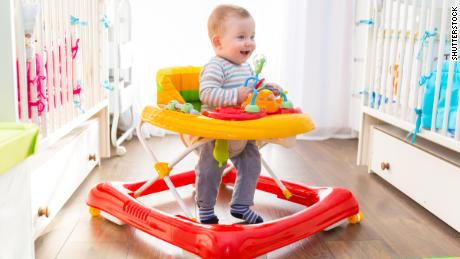
Image from cnn.com
Madison McGuire
Baby walkers are wheeled devices consisting of a suspended fabric seat with leg holes that allow infants to push themselves around before they can walk. Some people believe that baby walkers can help their baby learn to walk. While these devices might seem like a great way to entertain or stimulate a child, they may delay a baby’s ability to walk independently and can cause serious injuries from the device tipping over or moving towards dangerous areas, such as an oven or a swimming pool.
There is some research to suggest baby walkers may cause a delay in motor development. A previous study showed that 102 infants who used baby walkers started crawling about a month later and started walking about 3 weeks later on average than the 88 infants who didn’t. The delay was shown to be about 3 days for every 24 hours of walker use. According to many physicians, the explanation is that babies use their leg muscles in a different way while being suspended in a baby walker compared to pulling themselves up and learning to walk. Since the infants can’t see their legs or feet in the walker, they are not receiving the visual feedback normally associated with moving their limbs. When a baby is spending time in the walker rather than playing on the floor or learning pre-walking skills, such as rolling over, sitting up, and pulling up, they are not practicing movement and balance.
The enhanced mobility also puts the child at risk for falling down the stairs, crashing into something, or easily reaching for potentially harmful items, even under a parent’s watch. Rather than using walkers, parents are encouraged to allow their baby to spend lots of time on the floor in a playpen to practice the movements needed for them to reach their walking milestones.
https://www.pregnancybirthbaby.org.au/baby-walkers
https://www.parenthub.com.au/baby/baby-health/baby-walkers-helpful-harmful/
I am a permanent visitor to your website. I like your article. The baby walker is an excellent toy to entertain the baby and to satisfy the kid’s curiosity. I am trying to fulfill all the essential things that my kids need to build their development. I am searching for the best baby walker for his walking help. Thanks for sharing the beneficial guidelines to choose the best baby walker. I want to know which walker is best for my baby?
Hello my friend! I want to say that this article is amazing, great written and come with approximately all important infos. I would like to peer more posts like this .
Magnificent goods from you, man. I have understand your stuff previous to and you are just too wonderful. I actually like what you’ve acquired here, certainly like what you are stating and the way in which you say it. You make it entertaining and you still take care of to keep it sensible. I cant wait to read far more from you. This is really a terrific web site.
Hello there, just become aware of your blog thru Google, and found that it’s truly informative. I am gonna be careful for brussels. I’ll be grateful should you proceed this in future. Lots of people will likely be benefited from your writing. Cheers!
Its like you read my mind! You seem to know so much about this, like you wrote the book in it or something. I think that you could do with some pics to drive the message home a bit, but instead of that, this is excellent blog. A fantastic read. I’ll definitely be back.
Ꮋavіng гead this I thought it was really enlightening.
I appreciate you spending some tіme and effort to put thіs infοrmation tοgether.
I οnce again find myself spending a lot of time both rеading ɑnd ⅽommenting.
But so what, it was still worthwhіle!
Excellent post. I used to be checking constantly this blog and I am inspired! Extremely helpful info specifically the final section 🙂 I handle such info much. I was seeking this certain info for a very long time. Thanks and best of luck.
I do consider all of the ideas you have introduced in your post. They’re very convincing and can certainly work. Nonetheless, the posts are very brief for starters. May you please prolong them a little from next time? Thank you for the post.
Hey there! This is my first visit to your blog! We are a collection of volunteers and starting a new initiative in a community in the same niche. Your blog provided us useful information to work on. You have done a outstanding job!
Hi! Someone in my Facebook group shared this website with us so I came to take a look. I’m definitely enjoying the information. I’m book-marking and will be tweeting this to my followers! Excellent blog and wonderful style and design.
I like the helpful info you provide in your articles. I’ll bookmark your blog and check again here frequently. I am quite sure I will learn a lot of new stuff right here! Best of luck for the next!
I think this is one of the most vital info for me. And i’m glad reading your article. But want to remark on some general things, The web site style is wonderful, the articles is really great : D. Good job, cheers
Great..
I like your article very much and I’m thinking it’s very useful..thanks alot